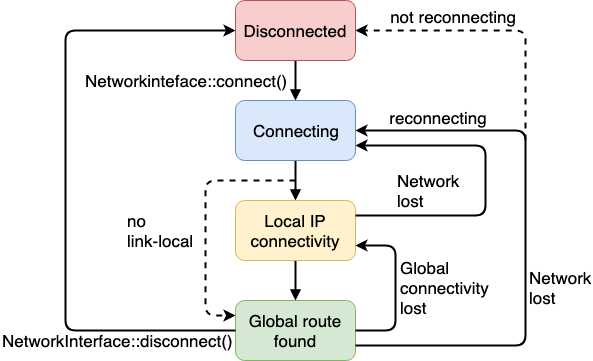Network status
This interface informs you about connection state changes asynchronously. Providing a method to register a callback function to a socket accomplishes this. Each time the network interface's state changes, it triggers the callback.

Usage
The callback needs to handle these possible network states:
/** Enum of connection status types
*
* Valid error codes have negative values.
*
* @enum nsapi_connection_status
*/
typedef enum nsapi_connection_status {
NSAPI_STATUS_LOCAL_UP, /*!< local IP address set */
NSAPI_STATUS_GLOBAL_UP, /*!< global IP address set */
NSAPI_STATUS_DISCONNECTED, /*!< no connection to network */
NSAPI_STATUS_CONNECTING, /*!< connecting to network */
NSAPI_STATUS_ERROR_UNSUPPORTED = NSAPI_ERROR_UNSUPPORTED
} nsapi_connection_status_t;
This API requires an interface to be monitored. For example, Ethernet:
EthernetInterface eth;
You need to provide the callback function, for example:
bool is_connected = false;
void status_callback(nsapi_event_t status, intptr_t param)
{
if (status == NSAPI_EVENT_CONNECTION_STATUS_CHANGE) {
switch(param) {
case NSAPI_STATUS_GLOBAL_UP:
if (!is_connected) {
start_my_cloud_client();
is_connected = true;
}
break;
default:
if (is_connected) {
stop_my_cloud_client();
is_connected = false;
}
break;
}
}
}
Now, the callback function is registered to the interface.
eth.attach(&status_callback);
This allows the application to monitor if network interface gets disconnected.
Optionally, the application might want to set the connect() method to nonblocking mode and wait until connectivity is fully established.
eth.set_blocking(false);
eth.connect(); // Return immediately
By default, the connect() call blocks until NSAPI_STATUS_GLOBAL_UP state is reached. Some applications might require only link-local connectivity and therefore do not need to block that long. In those case monitoring the state changes is the preferred behavior.
Using multiple connection status callbacks
The NetworkInterface API includes two functions that the applications can use to register more than one status callback for each network interface:
/** Add event listener for interface.
*
* This API allows multiple callback to be registered for a single interface.
* When first called, an internal list of event handlers is created and registered to
* interface through attach() API.
*
* The application may only use the attach() or add_event_listener() interface. Mixing use
* of both leads to undefined behavior.
*
* @param status_cb The callback for status changes.
*/
void add_event_listener(mbed::Callback<void(nsapi_event_t, intptr_t)> status_cb);
/** Remove event listener from interface.
*
* Remove previously added callback from the handler list.
*
* @param status_cb The callback to unregister.
*/
void remove_event_listener(mbed::Callback<void(nsapi_event_t, intptr_t)> status_cb);
The callback prototype is the same as that for the NetworkInterface::attach().
The NetworkInterface::attach() is still functional, and it is a porting API that each interface should provide. The functions above use NetworkInterface::attach() internally, so the application cannot use both at the same time.
You must either refactor the application by replacing NetworkInterface::attach() calls with NetworkInterface::add_event_listener(), or the application must remain using the NetworkInterface::attach().
This optional and has a small RAM and ROM increase, so applications are not required to use it. Both APIs are still supported, but use is limited to one at a time.
Example
Registering a status callback that connection state changes trigger depends on whether the network interface provides this functionality.
#include "EthernetInterface.h"
#include "mbed.h"
#include "nsapi_types.h"
// Network interface
EthernetInterface eth;
Mutex print_mutex;
void safe_print(const char * msg)
{
print_mutex.lock();
printf(msg);
print_mutex.unlock();
}
void status_callback(nsapi_event_t status, intptr_t param)
{
safe_print("Connection status changed!\r\n");
switch(param) {
case NSAPI_STATUS_LOCAL_UP:
safe_print("Local IP address set!\r\n");
break;
case NSAPI_STATUS_GLOBAL_UP:
safe_print("Global IP address set!\r\n");
break;
case NSAPI_STATUS_DISCONNECTED:
safe_print("No connection to network!\r\n");
break;
case NSAPI_STATUS_CONNECTING:
safe_print("Connecting to network!\r\n");
break;
default:
safe_print("Not supported\r\n");
break;
}
}
int main()
{
safe_print("Status callback example!\r\n");
eth.attach(&status_callback);
eth.set_blocking(false);
safe_print("Connecting...\r\n");
eth.connect();
safe_print("Connecting started...\r\n");
wait(10);
safe_print("Disconnect\r\n");
eth.disconnect();
safe_print("Done\r\n");
}
Related content
- Network socket API reference overview.